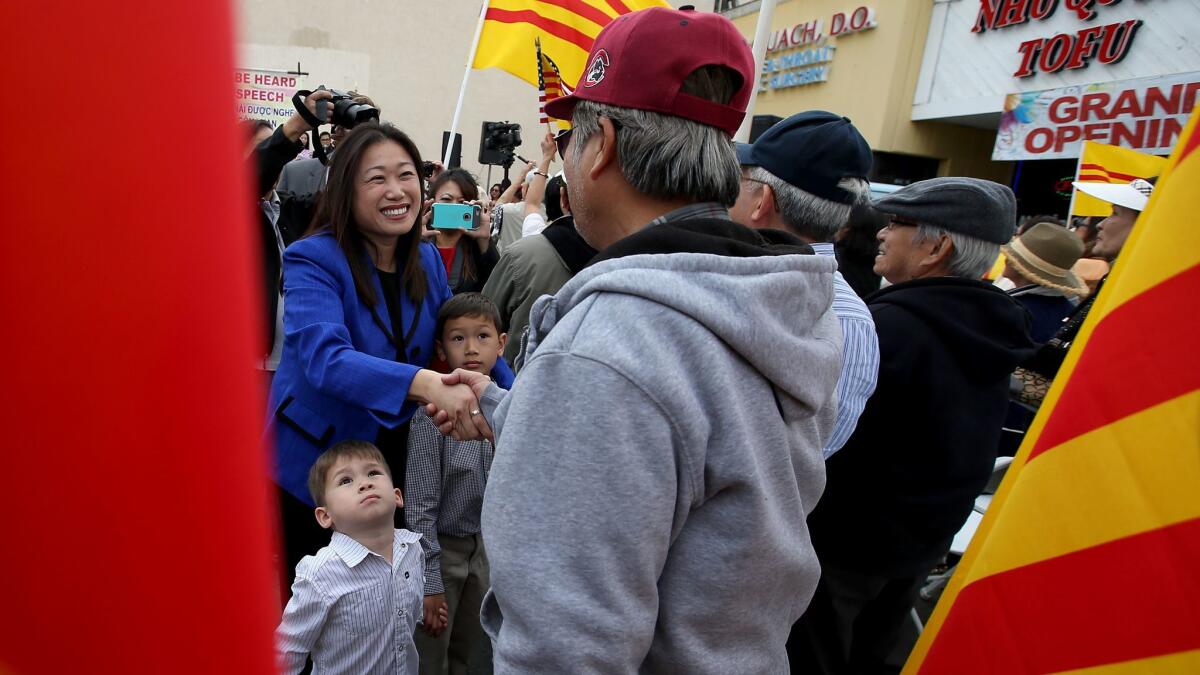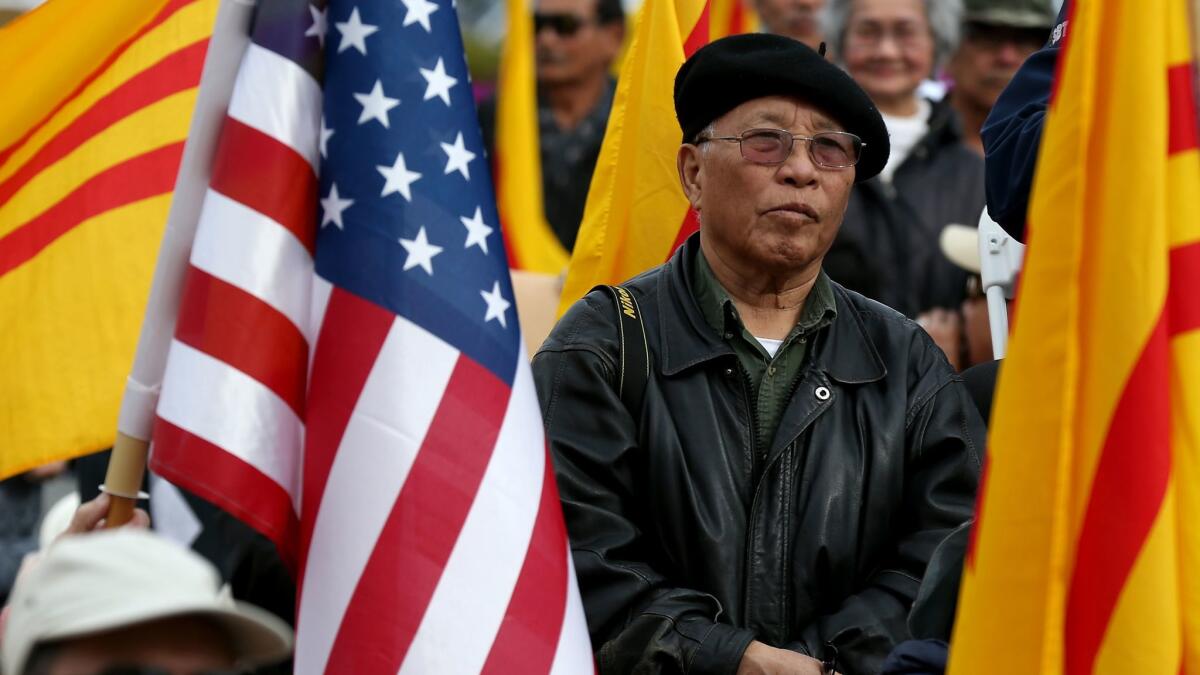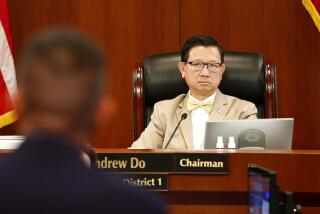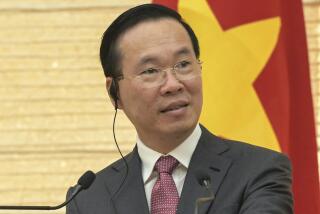Janet Nguyen’s removal from state Senate floor stirs free speech debate among Vietnamese Americans

Phat Bui seethed with anger when his hometown senator was removed last month from the state Senate floor.
State Sen. Janet Nguyen (R-Garden Grove) was pulled out of the chamber by two sergeants-at-arms as she tried to criticize the late state Sen. Tom Hayden over his opposition to the Vietnam War, saying the liberal stalwart had sided with a communist regime responsible for countless deaths.
For the record:
9:52 p.m. April 17, 2024An earlier version of this article stated that Bao Nguyen attended UCLA. He attended UC Irvine.
The action made Nguyen a political hero to people like Bui, a Garden Grove councilman, and many of his constituents in the heavily Republican Vietnamese American community of Orange County.
“Shutting down her voice is shutting down the voice of the Vietnamese Americans that she represents,” Bui told reporters at a rally in Westminster. “The very fact that we are here in the United States is because we value freedom.”
Shutting down her voice is shutting down the voice of the Vietnamese Americans that she represents.
— Phat Bui, Garden Grove councilman
But in some corners of Orange County’s Little Saigon, the claims of squelched freedom and censorship got eye rolls from those who recalled the swift retaliation visited against some in the community who have dared voice certain opinions.
“You know, freedom has never been free in Little Saigon,” said Kim Le, 27, a retail clerk from Santa Ana. “You can only say what you want if it’s PC, if you come out strong against the communists in Hanoi. If … it’s not a correct target, you are labeled and people avoid you…. I believe in democracy and I believe it’s not always seen here.”
The topic of free speech has always been fraught with tension in Little Saigon — the largest Vietnamese American enclave in the U.S. — where vocal anti-communist factions have long dominated the political culture.
At times, the conflict has had the feel of a full-contact sport.
Perhaps the memorable flashpoint was in 1999 when, outraged that a video store owner had placed the Vietnamese flag in his window, thousands of Vietnamese Americans showed up to picket. When one Westminster city councilman was notably absent from the video store demonstrations, protesters showed up at his restaurant business, too. The outcry stretched on for weeks, and the video store was eventually placed under new management.

A year after the protests shut down his video store business, Truong Van Tran told The Times: “There is no freedom to say what you like in the Vietnamese community. I was trying [to] debate and talk with them and show the freedom here. But they acted here like the communists do in Vietnam.”
For many of them, including pro-communist views under the umbrella of free speech is a nonstarter. In a study conducted in the late 1990s, 58% of Vietnamese respondents in Orange County said communists should be denied free speech, and 94% believed the U.S. allowed too much freedom of speech.
At one rally, Huu Dinh Vo, president of the Federation of Vietnamese American Communities of the USA, compared the senator’s curtailed attempt to deliver her speech to Rosa Parks’ Montgomery bus protest.
“Instead of a woman sitting down,” he told the audience, “we had a woman standing up to speak.”
In an interview, Nguyen said it’s “offensive” to expect the Vietnamese refugee community in Little Saigon to welcome symbols of the communist government they fled.
“They lived through so much and fought and lost everything,” Nguyen said. “This is not just a passion, it’s very personal. They’ve lived through it, and I’ve lived through it.”
“If you came to my home and wrapped yourself in the communist flag, you’re not welcome in my home,” Nguyen said. “I just can’t imagine that if you went into Watts dressed like the KKK that you’d be welcome.”
“I think her stance on free speech is a hypocritical one and that what happened in the Senate was a piece of political theater.”
— Viet Thanh Nguyen, USC professor and Pulitzer-winning novelist
The Vietnamese community in the U.S. is the result of a mass exodus out of Vietnam following the fall of Saigon in 1975. In Orange County, refugees created the largest population of people of Vietnamese descent outside of Vietnam, with more than 300,000.
Younger Vietnamese Americans are increasingly more likely to vote Democratic and be more liberal. But the older generation came at a time when the Republican party’s strong anti-communist rhetoric resonated with immigrants who had lost so much in the communist takeover of their homeland.
Viet Thanh Nguyen, a USC professor who won the Pulitzer Prize for his first novel, “The Sympathizer,” said Nguyen’s removal was not handled well. But he criticized her impassioned allusions to free speech.
“I think her stance on free speech is a hypocritical one and that what happened in the Senate was a piece of political theater,” he said.
He said the question of free speech in his community is complex, with aging hardliners setting the rhetorical agenda and leaving others afraid that they may be “tainted with communism” if they stray from convention.
“Janet Nguyen has never been an advocate for free speech in Orange County,” Viet Thanh Nguyen, 46, said.
The author, who, like the state senator, fled Vietnam as a child, cited an incident from 2009, when activists demonstrated against an art display with a photograph depicting communist icons. It showed a Vietnamese girl wearing a red tank top with a star at the center, resembling the communist flag. Next to her stood a bust of Ho Chi Minh.
The outcry shut down the Santa Ana exhibit titled “F.O.B. II: Art Speaks,” organized by members of the Vietnamese American Arts and Letters Assn. Viet Thanh Nguyen said the senator, then an Orange County supervisor, worked “behind the scenes” to lobby for its early closure when “they should have asked for a forum, a discussion.”
“Instead their first move was to ask for a protest,” he said, adding that actions like that make “Little Saigon a one-issue community, and that’s a dangerous place to be.”
Sen. Nguyen said she does not have a strong recollection of the incident.
Bao Nguyen, former mayor of Garden Grove, once protested an appearance by John McCain in Little Saigon at the height of his presidential campaign. Nguyen, then a student at UC Irvine, wore a shirt scrawled with “American Gook” to protest the Vietnam veteran’s previous use of the slur. According to news reports at the time, he and other young demonstrators were met with fierce opposition, and were kicked, shoved and spit on by older Vietnamese Americans who called them communists.
On a recent day, Hoang Tran, an anesthesiologist from Laguna Hills, loaded rice noodles and canned goods into his cart at Little Saigon’s ABC Supermarket. He said that Vietnamese Americans cared about a lot more things that are going on in the U.S. than is often captured as a result of the ongoing focus on communism.
“You don’t really hear about the other concerns of the Vietnamese. I think that more and more, Vietnamese worry about the economy. They worry about where the country they’re currently living in is heading. It’s been 42 years,” Tran, 48, said. “I think ... we should turn our attention to other issues.
Billy Le, who works as liaison between the Garden Grove Unified School District and the Vietnamese American community, said that young people often shy away from Little Saigon activism “because they don’t feel accepted. Things happen to make them feel not accepted,” he added, referring to the 2013 Tet parade when organizers voted to prevent LGBT people from marching in the event.
“There’s a perception that some aren’t free to be who they want to be,” Le, 30, said. “Our community actually has a lot of important social issues that we need to be vocal about, but we don’t have many brave souls to speak just yet.”
Johnny Yeung, a junior at Western High School in Anaheim who is half Vietnamese and half Chinese, had not seen the footage of Nguyen trying to speak. As he waited for his parents to finish buying groceries, the 17-year-old said he wasn’t very interested in hearing about protests of the past.
His concerns were not the same as those of the older generation. And, like many young Americans, he said he felt the impending largeness of the world in that particular way that teenagers on the brink of adulthood do.
“I’m interested in a lot of the world,” he said. “But the world can be outside Little Saigon.”
ALSO
Rainy, cooler weather moves into Southern California
Big L.A. earthquake could cause beach areas to sink up to 3 feet in seconds, new study finds
Riverside County sheriff’s deputy fatally shoot man near Desert Hot Springs
More to Read
Get the L.A. Times Politics newsletter
Deeply reported insights into legislation, politics and policy from Sacramento, Washington and beyond. In your inbox three times per week.
You may occasionally receive promotional content from the Los Angeles Times.








